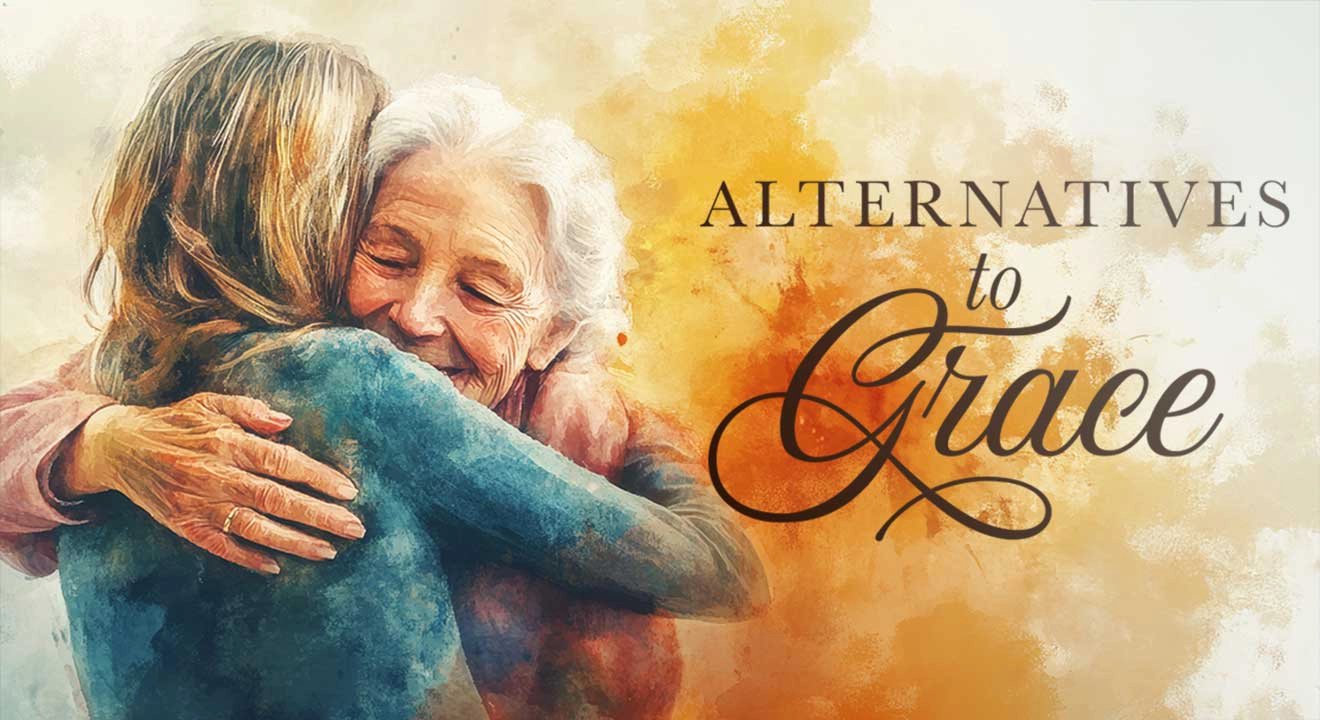Alternatives to Grace
By Pastor Chuck Swindoll

I have swept away your sins like a cloud.
I have scattered your offenses like the morning mist.
Oh, return to me,
for I have paid the price to set you free. (Isaiah 44:22 NLT)
If I choose not to risk, if I go the “safe” route and determine not to promote either salvation by grace or a lifestyle of grace, what are the alternatives? Four come to my mind, all of which are popular these days.
1. I can emphasize works over grace.
I can tell you that as a sinner you need to have a stronger commitment to Christ, demonstrated by the work you do in His behalf, before you can say that you truly believe. My problem in doing so is this: A sinner cannot commit to anything. He or she is spiritually dead, remember? There is no capacity for commitment in an unregenerate heart. Becoming an obedient, submissive disciple of Christ follows believing in Christ. Works follow faith. Behavior follows belief. Fruit comes after the tree is well rooted. Martin Luther’s words come to mind:
No one can be good and do good unless God’s grace first makes him good; and no one becomes good by works, but good works are done only by him who is good. Just so the fruits do not make the tree, but the tree bears the fruit. . . . Therefore all works, no matter how good they are and how pretty they look, are in vain if they do not flow from grace.
2. I can opt for giving you a list of dos and don’ts.
The list comes from my personal and/or traditional preferences. It becomes my responsibility to tell you what to do or not to do and why. I then set up the conditions by which you begin to earn God’s acceptance through me. You do what I tell you to do . . . you don’t do what I tell you not to do, and you’re “in.” You fail to keep the list, you’re “out.” This legalistic style of strong-arm teaching is one of the most prevalent methods employed in evangelical circles. Grace is strangled in such a context. To make matters worse, those in authority are so intimidating, their authority is unquestioned. Rare are those with sufficient strength to confront the list-makers.
3. I can leave no room for any gray areas.
Everything is either black or white, right or wrong. And as a result, the leader maintains strict control over the followers. Fellowship is based on whether there is full agreement. Herein lies the tragedy. This self-righteous, rigid standard becomes more important than relationships with individuals. We first check out where people stand on the issues, and then we determine whether we will spend much time with them. The bottom line is this: We want to be right (as we see it, of course) more than we want to love our neighbors as ourselves. At that point our personal preferences eclipse any evidence of love. I am of the firm conviction that where grace exists, so must various areas of gray.
4. I can cultivate a judgmental attitude toward those who may not agree or cooperate with my plan.
Grace killers are notorious for a judgmental attitude. It is perhaps the single most un-Christlike characteristic in evangelical circles today.
A quick glance back through the time tunnel will prove beneficial. Jesus found Himself standing before the brain trust of legalism, the Pharisees. Listening to Him were also many who believed in Him. He had been presenting His message to the crowd; it was a message of hope, of forgiveness, of freedom.
“As He spoke these things, many came to believe in Him. So Jesus was saying to those Jews who had believed Him, ‘If you continue in My word, then you are truly disciples of Mine; and you will know the truth, and the truth will make you free'” (John 8:30-32).
He spoke of the liberating power of the truth. Even though the official grace killers rejected His message, He assured them it could make them free. All who embrace grace become “free indeed.”
Free from what? Free from oneself. Free from guilt and shame. Free from the damnable impulses I couldn’t stop when I was in bondage to sin. Free from the tyranny of others’ opinions, expectations, demands. And free to what? Free to obey. Free to love. Free to forgive others as well as myself. Free to allow others to be who they are—different from me! Free to live beyond the limitations of human effort. Free to serve and glorify Christ. In no uncertain terms, Jesus Christ assured His own that His truth was able to liberate them from every needless restriction: “So if the Son makes you free, you will be free indeed” (John 8:36). I love that. The possibilities are unlimited.
Adapted by permission. The Grace Awakening Devotional, Charles R. Swindoll, © 2003, Thomas Nelson, Inc., Nashville, Tennessee. All rights reserved. Copying or using this material without written permission from the publisher is strictly prohibited and in direct violation of copyright law.
About the author
 Pastor Chuck Swindoll
Pastor Chuck Swindoll
Pastor Charles R. Swindoll has devoted his life to the accurate, practical teaching and application of God’s Word. He is the founding pastor of Stonebriar Community Church in Frisco, Texas, but Chuck’s listening audience extends far beyond a local church body. As a leading program in Christian broadcasting since 1979, Insight for Living airs around the world. Chuck’s leadership as president and now chancellor emeritus at Dallas Theological Seminary has helped prepare and equip a new generation of men and women for ministry.
